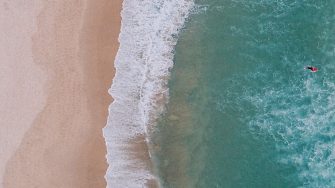
- What are the impacts of climate change likely to be?
- How accurately can we predict the spread of an oil spill?
These are some of the many questions that will be tackled in the Physical Oceanography course at UNSW. An overview is presented below.
How to study Physical Oceanography at UNSW
Major in Physical Oceanography within the Science degree program or choose the Advanced Physical Oceanography study plan within the Advanced Science degree program. These Mathematics degrees focus on various techniques used to solve the mathematical equations that describe fluid flow. How these solutions are then interpreted for the ocean and atmosphere also forms an integral part of the course.
The Science Degree Program is a three-year program with an opportunity for students with excellent results to enrol in the BSc Honours Program (an additional year) and obtain an Honours degree. The Advanced Science Degree Program is a four-year program where the final Honours year is compulsory.
If your interests are less mathematical and more in the environmental and biological study of the oceans, then the Marine Science plan in program 3970, administered by the School of BEES may be of more relevance.
What kind of jobs can I obtain when I graduate?
Oceanography at UNSW involves the measurement, modelling and prediction of processes that form the coupled oceanic and atmospheric system. These processes range from waves, deep ocean currents to cyclones, dust storms and climate change. In a time when environmental issues are of great concern, there are a number of career opportunities in Oceanography including research, operational and managerial aspects of the field.
In research, you could expect to work within the CSIRO, the Bureau of Meteorology, Universities or government agencies on how to develop and maintain state-of-the-art mathematical models that are used to understand and predict our environment.
A more hands-on approach to Oceanography is found in the operational aspect. Here you might focus on collection of data and interpretation of ocean/atmosphere variability with a view to advising agencies on environmental management. Agencies interested in these skills include the Sydney Waterboard and the Environmental Protection Authority.
Finally, there is the decision-making or managerial aspect of Oceanography. Fisheries or oil companies require management trained in these areas to liaise with scientists and develop policies that require an understanding of the complex issues that surround the long term preservation of our environment.
What do I study in the programs?
In the first year the programs have almost identical studies. You will study Mathematics, Physics and choose other courses from several other Schools. In the Marine Science study plan you will also be required to undertake a course in either biology, chemistry or geology.
Mathematics can be studied at the Ordinary level or at the Higher level depending on your interests and abilities, but study at the Higher level is recommended (especially if enrolled in the Advanced Science Program) and may be necessary for certain courses in later years.
In the final year of the Advanced Science Program, or if you do the Honours Science program (an extra year), you will do some course work but will also spend time writing a thesis. The aim of the thesis is for you to become involved in an active area of research of your choice. You could even discover something new, which is not as uncommon as you might think!
To find out the formal requirements (in terms of courses that you have to study), see Mathematics and Statistics Majors in Science for the Physical Oceanography Major in the Science degree program and the Advanced Physical Oceanography plan in the Advanced Science program.
For more details of individual courses, see Mathematics and Statistics courses.
What are the entry and continuation requirements?
You must meet the appropriate ATAR cut-off. Please see the UAC website where ATAR cut-offs are listed for each program.
- The Advanced Physical Oceanography study plan within the Advanced Science Degree is listed under UAC code 429350 (B- Advanced Sc (Hons)).
- The Physical Oceanography major within the Science Degree is listed under UAC code 429000 (BSc - Science).
In addition, you will need to have a certain level of prior knowledge of Mathematics. To find out the level of knowledge required for first year Mathematics courses, see Assumed Knowledge.
To remain within the Advanced Science Program, you are required to maintain an average of 70 in each year.
Which program should I choose?
If your main interest is clearly in Mathematics and you wish to acquire a degree with a theoretical emphasis on the understanding of our ocean and atmosphere, then choose the Physical Oceanography study plan within the Advanced Science Program or the Physical Oceanography major within the Science Program. It is harder to be accepted into the Advanced Science Program, but this is highly recommended where possible. Why not achieve your highest potential while at university? It will always be possible to transfer to the Science Program further into your studies. On the other hand, to transfer from the Science Program to the Advanced Science Program you will need to perform exceptionally well.
It is possible to swap between the Science Program Physical Oceanography and the Marine Science majors since they are both part of the Science Program.
If you really want to study oceanography and marine science in general then choose the Marine Science major within the Science Program. You will still study some mathematics to help you understand the mathematical and theoretical background to Oceanography, but also general marine science.
How do I get further information about these programs?
Physical Oceanography study plan or major:
A/Prof Mark Holzer
Phone: (02) 9385 7109
Email: mholzer@unsw.edu.au
or
School of Mathematics and Statistics
Phone: (02) 9385 7111
Fax: (02) 9385 7123
Email: ug.MathsStats@unsw.edu.au
